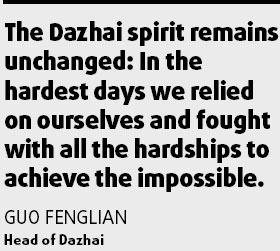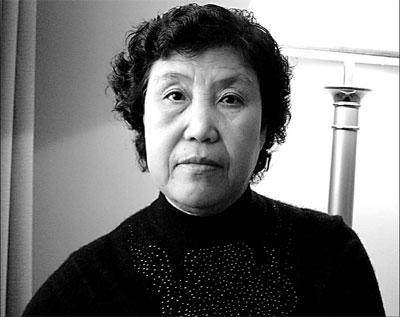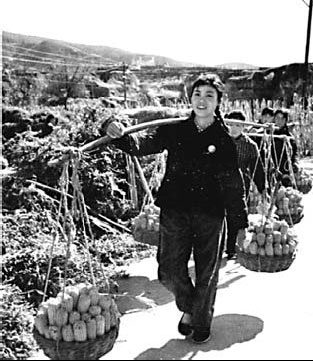Will of steel
At the age of 17, model worker Guo Fenglian was a household name. In an era before television, mobile phones and reality TV shows, Guo was the 1960s version of today's Supergirl winner. By toiling in terraced cornfields, and doing the arduous farm work even men found too harsh to bear, she became the head of Dazhai, a "pace-setter village" in North China's Shanxi province.
|
Guo Fenglian has led her villagers to set up numerous businesses. Lin Shujuan |
That was in 1963 and Chairman Mao Zedong called on the farmers across the nation to learn from this "Iron Girl."
During the 1960s and 70s, photographs of Guo were frequently splashed across newspapers and posters. But after China's reforms and opening-up policy in 1979, dramatic changes took place for both Dazhai and Guo.
Late Chinese leader Deng Xiao-ping scrapped the collective farming model and introduced a new method in which farmers were allotted plots of land and were allowed to make profits for themselves.
Dazhai, and its figure head Guo became a synonym for "leftist deviation" and was flooded with a stream of criticism.
In 1980, Guo was dismissed from all her posts and spent more than a decade studying at an apple farming institute. China's model worker disappeared from public life entirely.
In 1991 she returned as Dazhai Party chief to a village stricken by poverty but Guo adapted quickly and after more than a decade of developing industry and tourism, the small village, with a population of 500 and covering less than 2 sq km was reborn.
In 2006, it reported a per capita net income of 7,000 yuan ($1,000), which was nearly twice the national average of 3,587 yuan ($512) for Chinese farmers in the same period.
Once again the media zoomed its focus on the village's remarkable progress and shone the spotlight back on Guo.
The "Iron Girl" had returned.
Today, Guo is a far cry from the 1960s images of a teenager toiling in the fields.

Wearing a black cashmere sweater paired with elegant black pants and sporting a fashionably short haircut, Guo does not conform to the mental image many older Chinese may still have of her.
She is not the rosy-cheeked female farmer previously featured in posters but looks more like a city career woman. And she's wearing make-up.
At 62, she looks much more like a woman in her late 40s.
Responding to the compliment on her appearance, Guo smiles.
"The times have changed," she says.
The 1960s was a time when a tough-looking woman without lipstick or eye shadow was in vogue. Chairman Mao once hailed in his poem: "The women of China cherish lofty ideals, and they prefer soldiers' armors to feminine costumes."
Back then, Guo never wore make-up but today pays more attention to her clothes and hairstyle as if she was making up for what she had lost in the prime of her life. She also encourages both of her daughters-in-law to visit beauty salons and to follow the latest fashion.
Her composure and skills at handling interviews are that of a seasoned pro and is expected considering the thousands of interviews she has conducted over the past 40 years.
Straightening her back during a photo session is an automatic reflex. Amiable and friendly, her answers are straight to the point, and she takes the initiative to raise questions to herself.
"What do you know about Dazhai? What do you think it is like to ask crops from a stony mountain?" asks Guo the moment Dazhai is mentioned.
She provides a brief history of the village and remarks. "It seems that few of you youngsters know about such a history and tradition."
Although she is reluctant to go into details about her fall from grace in the early 1980s, Guo talks of her childhood and how her early years formed her character.
"My parents died when I was only 3, and my grandmother brought me up. It is natural for me not to rely on others, and to be satisfied with what I have," she says.
"When I was a girl, Party Secretary Chen Yonggui (who later became vice-premier), and other veteran village leaders treated me very kindly.
"In order not to let them down, I tried to do the best I could.
|
Guo Fenglian doing hard farm work in the 1960s. file photo |
"This principle has remained as the basis of my personal set of moral standards; my philosophy is always to reciprocate the good wishes and deeds of my kind fellows."
She paused, reflected and a few seconds later continued.
"It is unwise to be bitter about the past all the time," she says.
"Moreover," Guo quickly added in an excited tone, "times changed (then) and Dazhai was no longer a model village.
"But it didn't mean that what we Dazhai people had been striving for over the decades was a mistake.
"We were by no means wrong by working hard and striving for self-reliance."
Upon returning to Dazhai, she realized this hard-working ethic needed to be redirected and her village "should keep up with the times."
She was determined that Dazhai should be in step with the nation-wide drive to build a socialist market economy and new countryside. Since 1992, Guo has led the villagers to set up numerous businesses involved in clothing, cement, food and beverage, coal mining and transportation.
The Dazhai walnut juice has become a name brand nationwide.
In the near future, the village will establish a 30-million-yuan ($4.3 million) plant to produce bio-fuel out of sorghum and cassava, says Guo.
"The Dazhai spirit remains unchanged: In the hardest days we relied on ourselves and fought with all the hardships to achieve the impossible.
"Today we need to carry forward the legacy."
(China Daily 04/01/2008 page20)
















